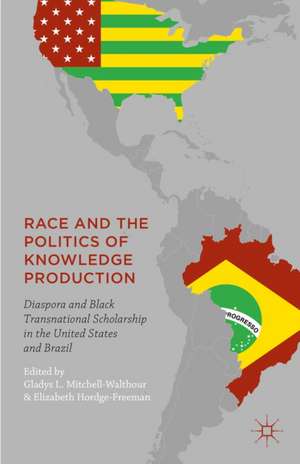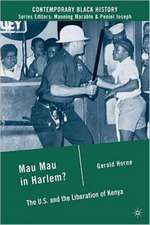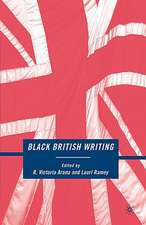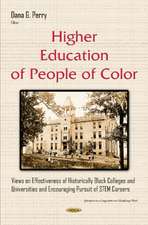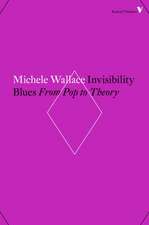Race and the Politics of Knowledge Production: Diaspora and Black Transnational Scholarship in the United States and Brazil
Editat de G. Mitchell-Walthour, E. Hordge-Freemanen Limba Engleză Hardback – 30 ian 2016
Preț: 727.00 lei
Preț vechi: 886.59 lei
-18% Nou
Puncte Express: 1091
Preț estimativ în valută:
139.11€ • 145.63$ • 115.11£
139.11€ • 145.63$ • 115.11£
Carte tipărită la comandă
Livrare economică 07-21 aprilie
Preluare comenzi: 021 569.72.76
Specificații
ISBN-13: 9781137553935
ISBN-10: 1137553936
Pagini: 240
Ilustrații: X, 226 p.
Dimensiuni: 140 x 216 x 14 mm
Greutate: 0.43 kg
Ediția:1st ed. 2016
Editura: Palgrave Macmillan US
Colecția Palgrave Macmillan
Locul publicării:New York, United States
ISBN-10: 1137553936
Pagini: 240
Ilustrații: X, 226 p.
Dimensiuni: 140 x 216 x 14 mm
Greutate: 0.43 kg
Ediția:1st ed. 2016
Editura: Palgrave Macmillan US
Colecția Palgrave Macmillan
Locul publicării:New York, United States
Cuprins
Introduction
In Pursuit of Dubois' 'Second-Sight' through Diasporic Dialogues; Elizabeth Hordge-Freeman and Gladys Mitchell-Walthour
PART I: INSTITUTIONS AS GATE-KEEPERS AND GAME-CHANGERS
1. Thinking Comparatively about Black Women's Studies in the United States and Brazil: The Politics of Knowledge Production; Kia Lilly Caldwell
2. Race and Democracy in the Americas: The Project and Beyond: The Genesis of the Race & Democracy in The Americas Project; David Covin
3. Brokering Black Brazil or Fostering Global Citizenship? Global Engagement that Empowers Black Brazilian Communities; Elizabeth Hordge-Freeman
4. Didn't Your Parents Like You?; Mojana Vargas
PART II: RWB: RESEARCHING WHILE BLACK AND FEMALE IN BRAZIL
5. A (Black) American Trapped in a ('Non-Black') Brazilian Body: Reflections on Navigating Multiple Identities in International Fieldwork; Tiffany Joseph
6. Guess Who's Coming to Research?: A Political Scientist's Reflections on Race, Class and Gender in Brazil; Jaira Harrington
7. But You (Don't) Look Like an African American: African Diaspora Looking Relations between Brazil and the United States; Reighan Gillam
8. Changing Notions of Blackness in Field Research in Salvador, Bahia, Brazil; Gladys Mitchell-Walthour
9. Studying Black-White Couples in Los Angeles and Rio de Janeiro; Chinyere Osuji
PART III: BLACK BRAZILIANS' REFLECTIONS IN THE US: MYTH OF A RACIAL RADICAL PARADISE
10. Living the African American way of life – Impressions and disillusions of an Afro-Brazilian Lady in the USA; Daniela F. Gomes da Silva
11. Increasing Resilience to Face Diversity: Race in Academic and Social Environments from Salvador to Los Angeles; Lucio Magano
12. Far Beyond 'Fresh Prince of Bel-Aire' – Impressions of an Afro-Brazilian Cinematographer and Activist in Philadelphia; Gabriela Watson Aurazo
Conclusion
Toward A Future African Diasporic Approach to Research; Gladys Mitchell-Walthour and Elizabeth Hordge-Freeman
In Pursuit of Dubois' 'Second-Sight' through Diasporic Dialogues; Elizabeth Hordge-Freeman and Gladys Mitchell-Walthour
PART I: INSTITUTIONS AS GATE-KEEPERS AND GAME-CHANGERS
1. Thinking Comparatively about Black Women's Studies in the United States and Brazil: The Politics of Knowledge Production; Kia Lilly Caldwell
2. Race and Democracy in the Americas: The Project and Beyond: The Genesis of the Race & Democracy in The Americas Project; David Covin
3. Brokering Black Brazil or Fostering Global Citizenship? Global Engagement that Empowers Black Brazilian Communities; Elizabeth Hordge-Freeman
4. Didn't Your Parents Like You?; Mojana Vargas
PART II: RWB: RESEARCHING WHILE BLACK AND FEMALE IN BRAZIL
5. A (Black) American Trapped in a ('Non-Black') Brazilian Body: Reflections on Navigating Multiple Identities in International Fieldwork; Tiffany Joseph
6. Guess Who's Coming to Research?: A Political Scientist's Reflections on Race, Class and Gender in Brazil; Jaira Harrington
7. But You (Don't) Look Like an African American: African Diaspora Looking Relations between Brazil and the United States; Reighan Gillam
8. Changing Notions of Blackness in Field Research in Salvador, Bahia, Brazil; Gladys Mitchell-Walthour
9. Studying Black-White Couples in Los Angeles and Rio de Janeiro; Chinyere Osuji
PART III: BLACK BRAZILIANS' REFLECTIONS IN THE US: MYTH OF A RACIAL RADICAL PARADISE
10. Living the African American way of life – Impressions and disillusions of an Afro-Brazilian Lady in the USA; Daniela F. Gomes da Silva
11. Increasing Resilience to Face Diversity: Race in Academic and Social Environments from Salvador to Los Angeles; Lucio Magano
12. Far Beyond 'Fresh Prince of Bel-Aire' – Impressions of an Afro-Brazilian Cinematographer and Activist in Philadelphia; Gabriela Watson Aurazo
Conclusion
Toward A Future African Diasporic Approach to Research; Gladys Mitchell-Walthour and Elizabeth Hordge-Freeman
Notă biografică
Gladys L. Mitchell-Walthour is Visiting Assistant Professor of Public Policy in the Department of Africology at the University of Wisconsin Milwaukee, USA. She was the 2013-2014 Lemann Visiting Scholar at the David Rockefeller Center for Latin American Studies at Harvard University, USA.
Elizabeth Hordge-Freeman is Assistant Professor of Sociology with a joint appointment in the Institute for the Study of Latin America and the Caribbean at the University of South Florida, USA. She is a 2015–2016 Fulbright Scholar to Brazil.
Elizabeth Hordge-Freeman is Assistant Professor of Sociology with a joint appointment in the Institute for the Study of Latin America and the Caribbean at the University of South Florida, USA. She is a 2015–2016 Fulbright Scholar to Brazil.
Textul de pe ultima copertă
In this co-edited volume, Gladys L. Mitchell-Walthour and Elizabeth Hordge-Freeman have invited contributors of African descent from the United States and Brazil to reflect on their multidimensional experiences in the field as researchers, collaborators, and allies to communities of color. Contributors promote an interdisciplinary perspective, as they represent the fields of sociology, political science, anthropology, and the humanities. They engage W.E.B. Du Bois' notion of 'second-sight,' which suggests that the unique positionality of Black researchers might provide them with advantages in their empirical observations and knowledge production. They expose the complex and contradictory efforts, discourses, and performances that Black researchers must use to implement and develop their community-centered research agenda. They illustrate that 'second-sight' is not inevitable but must be worked at and is sometimes not achieved in certain research and cultural contexts.
